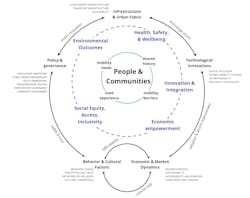Op-Ed: A call for outcomes-focused research in shared mobility
Why do we keep falling for the numbers? In the transportation world, all too often we point to ridership counts or emissions reductions as the ultimate badges of success. Sure, these figures matter—especially in a climate-challenged world—but they only scratch the surface of what we should really be asking: are these programs actually improving people’s lives and are these programs adapting to the conditions needed to truly affect change?
These questions are central to reshaping the conversation around shared mobility, which includes everything from bikeshare and carshare to on-demand transit services and micromobility. These services were supposed to tackle big societal problems: congestion, air pollution and inequity of who can get around safely and affordably. Yet, we’re still not looking deeply enough at how well we deliver on that promise.
Beyond metrics to meaning
Take your average micromobility initiative. Advocates tout the number of rides taken, plus a guesstimate of greenhouse gas (GHG) emission reductions. Wonderful—but does this mean there are fewer car trips being taken, and if so, to what end? And what if those numbers aren’t actually translating into cleaner air where it’s needed most? Or how do we know that equity requirements are achieving their goal of improving access for underserved neighborhoods? That’s where we have to go beyond the data dump and ask: are we, in fact, improving health outcomes, reducing time and cost burdens for workers on the night shift and cutting asthma rates in communities historically plagued by pollution?
Plenty of transportation innovators forget that the purpose of those hard metrics isn’t to check a box for a sustainability report. It’s to show real-world benefits—to create a society where transportation is not just an afterthought, but a force for equity and resilience.
Granted, it is a lot easier to report outputs, as outcome-oriented research is time-consuming, but isn’t it worth it?
Why it matters for equity
Shifting to an outcomes-focused lens is especially critical for low-income and marginalized communities. These are the groups that often get left behind, even in the greatest mobility success stories. Whether it’s a bus route that doesn’t run late enough for night shift workers or a carshare program that’s inaccessible without a credit card, these gaps undermine the core promise of shared mobility: that you don’t need to own a car to participate in modern life.
But how do we measure success? Not just by counting how many people have access to a new app or discount, but by documenting whether they can use that access to get a better job, pursue higher education or simply live a healthier life. If we can’t show those deeper transformations, we’ll always be stuck at the level of pilot projects and shiny press releases.
Shared Use Mobility Center’s (SUMC) new research agenda: Prioritizing outcomes
SUMC is determined to change this narrative. Our new research agenda, based on a decade of work connecting transportation change-makers across the public, nonprofit and private sectors, pushes for a fundamental shift. By 2028, we want to cement an outcomes-focused approach in six critical areas—resilience, behavior change, health and safety, social equity, environmental sustainability and economic empowerment.
Rather than just gathering ride counts, we’re focusing on tangible quality-of-life improvements by centering people and communities at the core of a highly complex system. Using this model, we can ask why in addition to how much. For example, which communities saw lower emissions levels and why? Who gained better job access and why? Where did families see reduced healthcare costs and why? If we don’t measure the why, we’ll never know if shared mobility genuinely delivers the equity and climate benefits we say it can.
Why now?
Society can no longer afford to keep chasing numbers that look good on paper but fail to translate into meaningful progress. From raging wildfires in the West to rising sea levels on every coast, climate change demands urgent action. Meanwhile, our most vulnerable neighbors feel the burden of this crisis the hardest.
Shared mobility is part of the solution but only if we ensure that it actually solves problems. When local leaders, community organizations and transportation agencies commit to an outcomes-first ethos, they’ll be better equipped to design—and keep refining—programs that genuinely serve everyone.
Further, when we center the conversation on whether people’s lives are actually improving rather than getting hung up on labels or partisan talking points, we can instead create a common language that resonates across political and cultural divides. Whether you call it sustainability, public benefit or simply better access, the shared goal is the same: ensuring that the transportation programs we champion deliver tangible benefits where they are needed most.
The road ahead
This is an open invitation. We need policymakers to direct funding toward outcomes-focused research. We need communities to hold transit agencies and private innovators accountable for impacts that matter in daily life. We need established programs to implement feedback loops when evaluating program designs. We need researchers and think tanks, including SUMC, to provide the tools that measure not only usage, but also long-term societal benefits. There are many researchers already doing this work. Still, actionable data and policy recommendations often fall on deaf ears, with decision makers often only looking to report a 20 percent increase in ridership. Let’s change the narrative together by centering on people rather than modes and digging deeper into the system itself that enables the outputs.
We should still celebrate ridership gains and emission reductions, but they’re the starting point, not the end goal. By peeling back the layers and examining the inputs, as well as the outcomes, it’s time to stop letting big numbers dazzle us into complacency and start insisting funding takes into account the resources and time needed to produce the kind of evidence that shows shared mobility is really making a difference—especially for those who need it most and how best we can design programs to realize those benefits. If we can focus on outcomes over outputs, we stand a chance of building a transportation future that is not only innovative but also transformative.
And that’s the ultimate benchmark of success.
About the Author

Lauren N. McCarthy
Lauren N. McCarthy, Ph.D., is the senior director of research and impact at the Shared-Use Mobility Center (SUMC), where she oversees the research agenda and provides oversight, guidance and direction for multiple research initiatives and programs. She also leads impact analysis and reporting, ensuring that SUMC’s projects are data-driven, culturally responsive and community-centered.
Her experience includes coordinating large-scale policy evaluations, designing capacity-building programs with community partners and guiding culturally responsive research methodologies. Her work focuses on the analysis, diffusion and impact of investments in transportation systems, emphasizing community-centered outcomes. Before joining SUMC, she was program manager and senior researcher at the Center for Transportation Public-Private Partnership Policy at George Mason University and was selected as a Google public policy fellow in 2019, focusing on technology adoption in marginalized communities.
She earned her Ph.D. from the Schar School of Policy and Government at George Mason University, where her dissertation, “Shared Mobility Systems: Frameworks to Understand the Growth of an Industry and the Prospect of Public Investments,” explores diffusion models and evaluation frameworks applicable to novel transportation technologies, particularly micromobility. She also holds a Bachelor of Science in business administration and a master’s in geography from the State University of New York at Buffalo.
